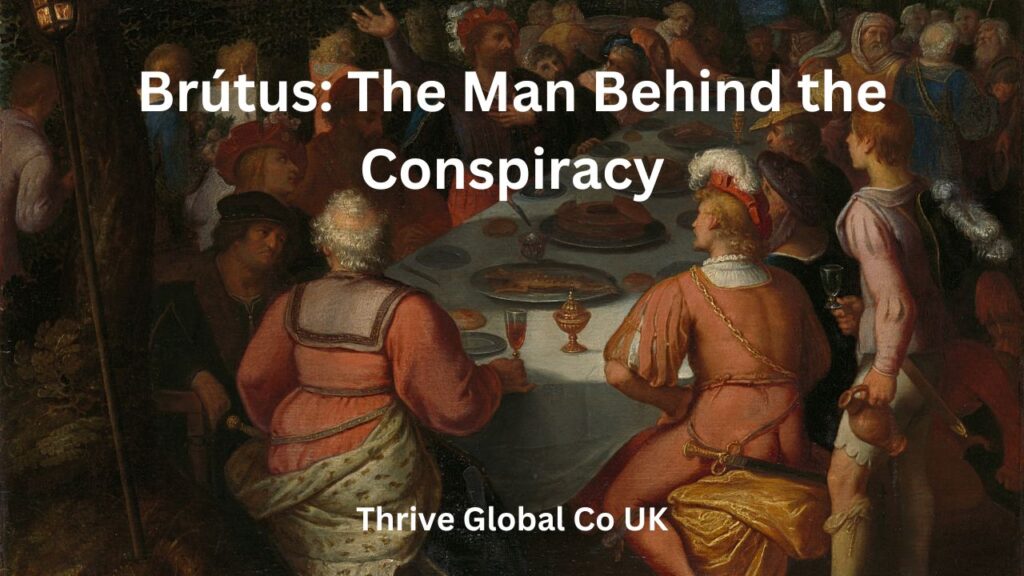Table of Contents
ToggleBrútus Background and Position
Brutus is a respected Roman senator and a close friend of Julius Caesar. His noble lineage and reputation for integrity earn him respect and admiration from both his peers and the Roman populace. This respect is crucial as it places him at the center of the political and moral conflicts that drive the play.
Brutus’ complex character and role in history have been immortalized in literature, most notably in William Shakespeare’s play “Julius Caesar.” In this iconic portrayal, Brutus emerges as a tragic figure torn between his loyalty to Rome and his loyalty to his friend.
Shakespeare’s Brutus is driven by a profound sense of duty and honor, grappling with the consequences of his actions even as he remains steadfast in his conviction that he acted for the greater good.
Through the character of Brutus, Shakespeare delves into timeless themes of betrayal, idealism, and the complexities of political power, ensuring that Brutus remains a figure of enduring fascination and interpretation for generations to come.
Internal Conflict
-
Loyalty to Caesar
- Personal Relationship: Brutus and Caesar share a deep bond of friendship. Caesar trusts Brutus implicitly, which makes Brutus’s eventual betrayal a profound and tragic twist.
- Public Perception: Brutus is acutely aware of how his actions toward Caesar will be perceived by the public and his peers. His reputation for honor and integrity complicates his decision-making process.
-
Duty to Rome
- Fear of Tyranny: Brutus is deeply concerned about Caesar’s rise to power and the potential for him to become a tyrant. He fears that Caesar’s ambition will undermine the Republic and lead to autocratic rule.
- Moral Dilemma: Brutus’s internal struggle is rooted in his sense of duty to Rome versus his loyalty to his friend. This conflict is the crux of his character’s complexity.
The Decision to Join the Conspiracy
-
Cassius’s Persuasion
- Manipulation: Cassius plays a significant role in persuading Brutus to join the conspiracy against Caesar. He appeals to Brutus’s sense of honor, patriotism, and duty, framing the assassination as a noble act to protect the Republic.
- Forged Letters: Cassius forges letters purportedly from Roman citizens, expressing their fear of Caesar’s rule and urging Brutus to take action. This manipulation convinces Brutus of the public’s support for the conspiracy.
-
Brútus Justification
- Noble Intentions: Brutus justifies his involvement by convincing himself that the assassination is for the greater good of Rome. He views it as a preemptive measure to prevent Caesar from becoming a dictator.
- Moral Rationale: Brutus’s rationale is deeply rooted in his belief that his actions, though extreme, are necessary to preserve the Republic and protect its citizens from tyranny.
Also Read: Dr Aaron Wohl Arrested: The Real Facts
The Assassination of Caesar
- The Act
- Public Stabbing: The conspirators, including Brutus, stab Caesar to death in the Senate. Caesar’s last words, “Et tu, Brute?” highlight his shock and betrayal upon seeing Brutus among his assassins.
- Symbolism: Brutus’s participation in the assassination is a powerful symbol of his internal conflict and the complexity of his motivations. It marks the ultimate betrayal of friendship in favor of political ideals.
- Aftermath
- Public Reaction: The immediate aftermath of the assassination is chaos and confusion among the Roman populace. Brutus attempts to justify the act by delivering a speech to the public, emphasizing his love for Rome and his fear of Caesar’s potential tyranny.
- Mark Antony’s Speech: Mark Antony, a loyalist to Caesar, delivers a masterful counter-speech that turns the public against the conspirators. He manipulates the emotions of the crowd, inciting them to revolt against Brutus and his co-conspirators.
The Brutus Downfall
- Civil War
- Battle of Philippi: The assassination leads to a civil war between the forces of the conspirators and those loyal to Caesar, led by Mark Antony and Octavian. Despite his noble intentions, Brutus’s cause is ultimately doomed.
- Tragic Hero: Brutus embodies the characteristics of a tragic hero. His fatal flaw, or hamartia, is his naivety and rigid sense of honor. He underestimates the complexities of political power and the consequences of his actions.
- Death
- Suicide: Facing inevitable defeat, Brutus chooses to take his own life rather than be captured. His death is a poignant end to his tragic journey, marked by his unwavering commitment to his ideals.
- Noble End: Even in death, Brutus maintains his honor. His suicide is portrayed as a final act of control and dignity, underscoring his tragic nobility.
Legacy of Brutus
-
Moral Complexity
- Mixed Motives: HIs actions are driven by a complex interplay of personal loyalty, moral duty, and political ideals. His character highlights the nuanced nature of human motivations and the difficulty of making ethical decisions.
- Tragic Figure: Shakespeare portrays him as a tragic figure whose noble intentions lead to unintended and devastating consequences. His story serves as a cautionary tale about the flawed nature of human judgment and the tragic potential of noble intentions.
-
Enduring Impact
- Cultural Symbol: He remains a powerful symbol of the moral and ethical dilemmas faced by individuals in positions of power. His story continues to resonate in discussions about loyalty, honor, and the corrupting influence of power.
- Literary Legacy: His character has influenced countless works of literature and drama, cementing his place as one of Shakespeare’s most memorable and complex creations.
Conclusion
Brútus is a multifaceted character whose internal struggles and tragic fate make him one of Shakespeare’s most compelling figures. His journey from a trusted friend to a tragic hero offers profound insights into the complexities of human nature and the often-painful consequences of our choices. Through Him, Shakespeare explores themes of loyalty, honor, and the price of political ambition, leaving us with a timeless reflection on the human condition.
Also Read: Unicorn Theme Cake Bringing Fantasy to Your Party
FAQs
- Why did Brútus join the conspiracy against Caesar?
- He joined the conspiracy out of a sense of duty to Rome. He feared that Caesar’s rise to power would lead to tyranny and believed that assassinating Caesar was necessary to preserve the Republic.
- What internal conflicts did Brutus face?
- He struggled between his loyalty to his friend Caesar and his duty to Rome. He was torn between personal loyalty and his belief in the greater good of protecting the Republic from potential tyranny.
- How did Cassius manipulate Brutus?
- Cassius manipulated Brutus by appealing to his sense of honor and duty. He used forged letters to convince Brutus that the Roman people supported the conspiracy and feared Caesar’s rule.
- What was the significance of Caesar’s last words, “Et tu, Brute?”
- Caesar’s last words highlight the deep sense of betrayal he felt upon seeing he among his assassins. It underscores the tragic nature of Brutus’s actions and the profound personal conflict at the heart of the play.
- Why is Brutus considered a tragic hero?
- He is considered a tragic hero because he embodies noble intentions and a fatal flaw—his naivety and rigid sense of honor. His actions, driven by a desire to do what he believes is right. Ultimately lead to his downfall and tragic end.



